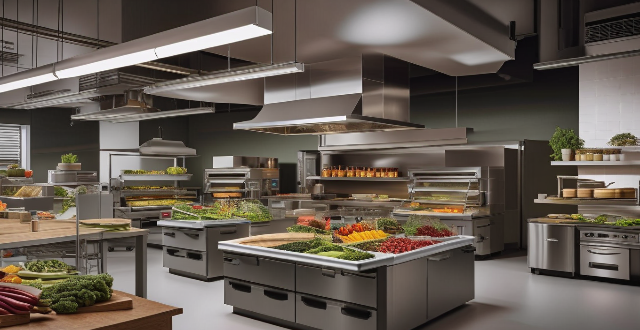Cross-contamination is a significant concern in commercial kitchens, where food safety and quality are paramount. To prevent it, strict procedures and practices must be implemented to minimize the risk of harmful bacteria or allergens spreading from one food item to another. Key strategies include using separate cutting boards and utensils for different types of food, proper handling of raw foods, sanitizing work surfaces and equipment, avoiding cross-contact during cooking, safe storage practices, allergen management, and maintaining personal hygiene and staff training. By implementing these practices, you can significantly reduce the risk of cross-contamination in your commercial kitchen, ensuring that your customers receive safe and high-quality meals every time.

How Can Cross-Contamination Be Prevented in a Commercial Kitchen?
Cross-contamination is a serious concern in commercial kitchens, where food safety and quality are paramount. To prevent cross-contamination, it's essential to implement strict procedures and practices that minimize the risk of harmful bacteria or allergens spreading from one food item to another. Here's a comprehensive guide on how to achieve this:
Use Separate Cutting Boards and Utensils
- Highlight: Always use separate cutting boards and utensils for raw meats, poultry, seafood, and ready-to-eat foods.
- Example: Designate different color-coded cutting boards for different types of food (e.g., red for meat, blue for fish, green for vegetables).
Proper Handling of Raw Foods
- Bullet: Wash hands thoroughly with warm, soapy water before and after handling any raw food items.
- Bullet: Use disposable gloves when handling raw meats, poultry, or seafood.
- Bullet: Discard any packaging that has come into contact with raw foods before storing them.
Sanitize Work Surfaces and Equipment
- Bullet: Clean and sanitize all work surfaces, equipment, and utensils after each use, especially if they have been in contact with raw foods.
- Bullet: Use a food-safe sanitizer solution and allow surfaces to air dry before using them again.
Avoid Cross-Contact During Cooking
- Bullet: Cook raw meats, poultry, and seafood separately from other foods to prevent juices from contaminating them.
- Bullet: Use a thermometer to ensure that foods are cooked to their proper internal temperatures to kill harmful bacteria.
Safe Storage Practices
- Bullet: Store raw meats, poultry, and seafood below ready-to-eat foods in refrigerators to avoid dripping juices onto them.
- Bullet: Keep allergens such as nuts or shellfish away from other foods to prevent accidental contamination.
Allergen Management
- Bullet: Clearly label allergens on menus and inform staff about potential allergens in ingredients.
- Bullet: Train staff on how to handle allergens safely and prevent cross-contact during preparation and service.
Personal Hygiene and Staff Training
- Bullet: Encourage staff to maintain good personal hygiene by washing hands frequently and covering coughs and sneezes.
- Bullet: Provide regular training sessions on food safety and cross-contamination prevention for all staff members.
By implementing these practices, you can significantly reduce the risk of cross-contamination in your commercial kitchen, ensuring that your customers receive safe and high-quality meals every time.